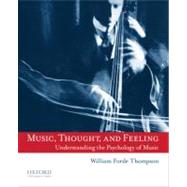
| Preface | |
| Introduction | |
| Learning Outcomes | |
| Overview of Book Contents | |
| Abiding Controversies | |
| Recent Areas of Research Growth Additional Readings | |
| Origins of Music | |
| Learning Outcomes | |
| Prehistoric Music Adaptationist | |
| Accounts Theories Based on Reproductive Benefits | |
| Theories Based on Survival Benefits Nonadaptationist | |
| Accounts Precursors to Music Additional Readings | |
| Musical Building Blocks | |
| Learning Outcomes | |
| The Elements of Sound Periodic Motion | |
| The Discovery of Music Within Sound Sensory Consonance and Dissonance | |
| Tuning Systems Sensitivity to Pitch Models of Pitch Perception | |
| Absolute Pitch Timbre | |
| Reconstructing Music Additional Readings | |
| Music Acquisition | |
| Learning Outcomes | |
| Musical Infants Music in the Womb | |
| Investigating Music Perception Among Infants Melodic Contour Consonance and Dissonance | |
| Pitch Relations Scale Structure Phrase Structure Harmony Key | |
| Rhythm Memory for Music | |
| Learning and Enculturation Additional Readings | |
| Perceiving Music Structure | |
| Learning Outcomes | |
| Arrangements of Sound Relative Pitch Melodic Contour Scale | |
| Structure Large-Scale | |
| Structure Melodic Expectancies | |
| Implicit Memory for Music Implied | |
| Harmony Musical Key Implied | |
| Key Rhythm Additional Readings | |
| Music and Emotion | |
| Learning Outcomes | |
| Emotion Work Emotion and Cognition | |
| Theories of Music and Emotion Empirical Studies | |
| Do Listeners Agree on the Emotional Meaning of Music? | |
| How Do Listeners Respond Emotionally to Music? | |
| Compositional and Expressive Signals of Emotion | |
| What Properties of Music Lead to an Emotional Response? | |
| Is There a Universal Link Between Music and Emotion? | |
| Sources of Emotion in Music Additional Readings | |
| Music and the Brain | |
| Learning Outcomes | |
| What's in a Brain? | |
| The Search for Music Inside the Brain | |
| Neurological Disorders | |
| Techniques of Neuroimaging Neuroimaging and Music | |
| A Rapidly Evolving Field Additional Readings | |
| Performing Music | |
| Learning Outcomes | |
| Playing Music Acquiring Performance | |
| Skill Communicating Musical | |
| Structure Communicating Emotional Meaning | |
| Singing Improvising Gestures and Facial Expressions | |
| Evaluating Performance | |
| The Craft of the Performer Additional Readings | |
| Composing Music | |
| Learning Outcomes | |
| The Radius of Creativity | |
| Composers and Listeners Cognitive Constraints on Composition Composing with Multiple Voices | |
| Where Do New Ideas Come From? | |
| The Craft of Music Composition | |
| Music and Other Abilities | |
| Learning Outcomes | |
| Is Music Unique? | |
| Short-Term Effects of Music | |
| Long-Term Benefits of Music Educational Implications | |
| Additional Readings | |
| Glossary | |
| References | |
| Author Index | |
| Subject Index | |
| Table of Contents provided by Publisher. All Rights Reserved. |
The New copy of this book will include any supplemental materials advertised. Please check the title of the book to determine if it should include any access cards, study guides, lab manuals, CDs, etc.
The Used, Rental and eBook copies of this book are not guaranteed to include any supplemental materials. Typically, only the book itself is included. This is true even if the title states it includes any access cards, study guides, lab manuals, CDs, etc.